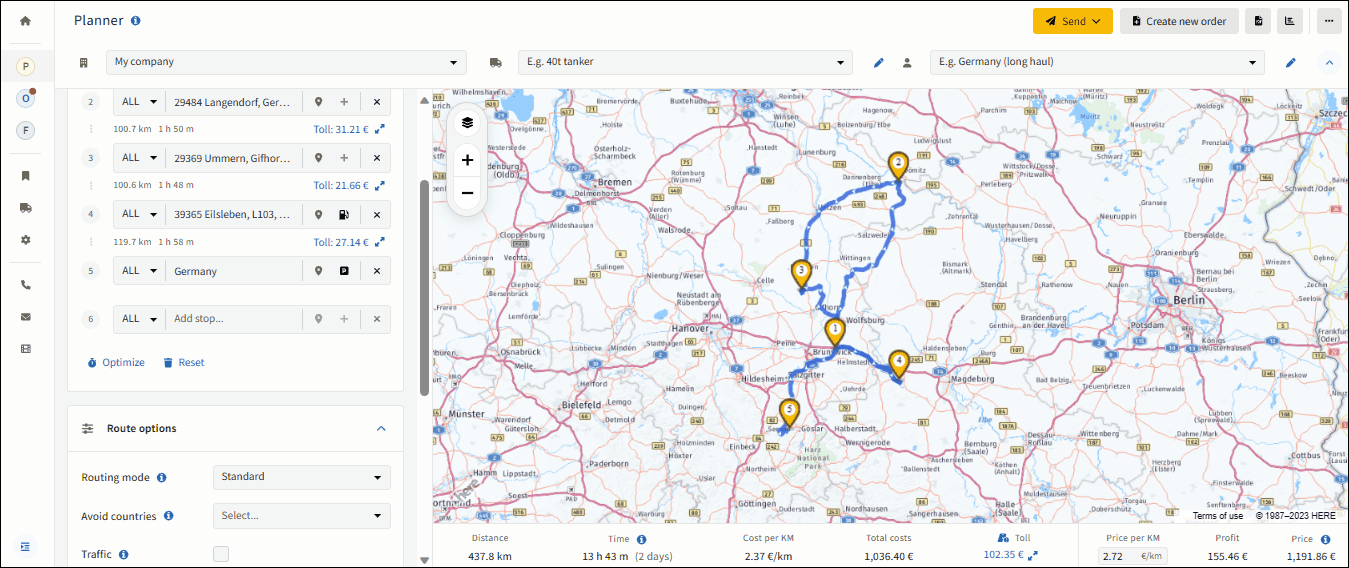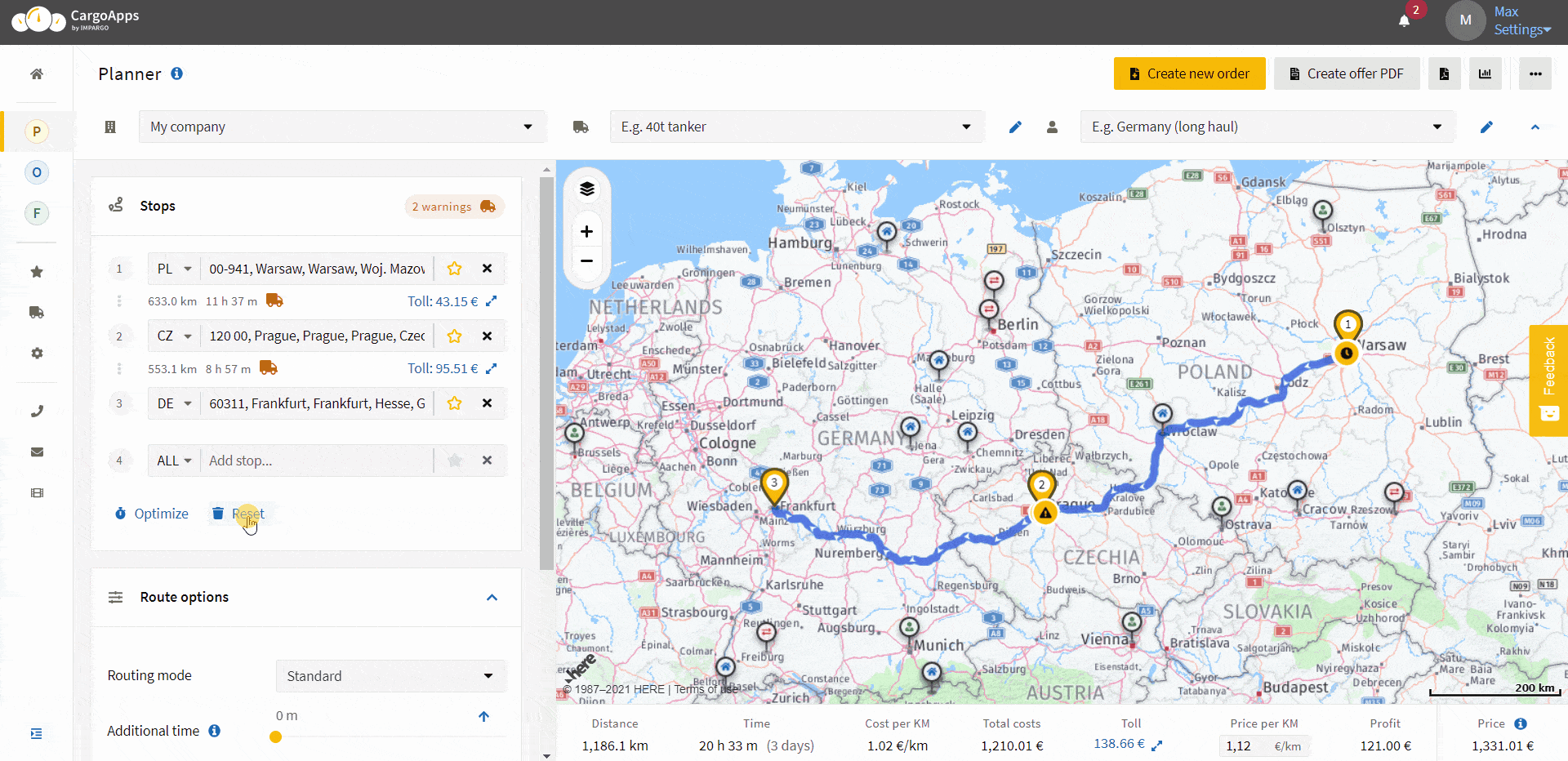Table of Content
- What is LTL Transport in Trucking Logistics?
- How LTL Freight Services Work
- Common Uses of LTL Freight Services
- Factors to Consider When Choosing LTL Freight Services
- How to Optimize LTL Freight Services
- Benefits of LTL Transport
- LTL Transport Management Software Solutions
- When to Use LTL Transport
- LTL Transportation Management System (TMS)
What is LTL Transport?
Less Than Truckload (LTL) transport is a cost-effective shipping method designed for businesses with smaller shipment volumes. Unlike Full Truck Load (FTL) shipping, LTL involves sharing truck space with other shippers. This method optimizes costs by charging only for the portion of the truck used, making it an ideal solution for smaller loads.
How LTL Freight Services Work
- Pickup: Multiple small shipments are collected from various shippers, allowing efficient use of transportation resources from the start.
- Consolidation: Shipments are brought to a terminal or distribution center where they are consolidated, optimizing truck space and reducing transportation costs.
- Linehaul: The consolidated shipments are transported to a regional hub or another distribution center, ensuring streamlined movement across long distances.
- Deconsolidation: Upon reaching the destination hub, shipments are sorted and separated based on their final delivery locations.
- Delivery: Individual shipments are then delivered to their respective final destinations, ensuring timely and efficient delivery of goods.
Common Uses of LTL Freight Services
- Small to Medium-Sized Businesses: LTL freight services are ideal for businesses that do not have enough cargo to fill a full truckload, providing a cost-effective shipping solution.
- E-commerce and Retail: Frequently utilized by e-commerce companies and retailers for regular restocking and customer deliveries, ensuring consistent inventory levels.
- Manufacturing and Distribution: Essential for shipping raw materials, components, and finished goods, supporting efficient production and supply chain operations.
Factors to Consider When Choosing LTL Freight Services
- Service Reliability
- Carrier Reputation: Select carriers with a proven track record of reliability and on-time deliveries to ensure your shipments reach their destinations as scheduled.
- Customer Reviews: Check customer reviews and testimonials to gauge service quality and carrier performance.
- Transit Times
- Delivery Speed: Consider the carrier's transit times and ensure they align with your shipping needs, particularly for time-sensitive deliveries.
- Expedited Options: Look for carriers that offer expedited shipping for urgent deliveries, providing flexibility in meeting tight deadlines.
- Pricing
- Transparent Costs: Ensure pricing is clear and transparent, with no hidden fees, allowing you to budget accurately for shipping expenses.
- Rate Comparisons: Compare rates from multiple carriers to find the best value for your shipping requirements, optimizing your logistics budget.
How to Optimize LTL Freight Services
- Proper Packaging
- Secure Packaging: Use durable packaging materials to protect goods during transit, minimizing the risk of damage.
- Labeling: Clearly label all shipments to prevent misrouting and delays, ensuring accurate delivery.
- Advanced Technology
- Transport Management Systems (TMS): Utilize a TMS to manage shipments, track deliveries, and optimize routes, enhancing operational efficiency.
- Automated Notifications: Set up automated notifications for real-time updates on shipment status, improving visibility and communication.
- Strategic Planning
- Consolidate Shipments: Combine smaller shipments into a single LTL shipment to maximize efficiency and reduce costs.
- Plan Ahead: Schedule regular shipments to take advantage of consistent pricing and carrier availability, ensuring smooth logistics operations.
Benefits of LTL Transport
Less-than-Truckload (LTL) transport offers several benefits for businesses, especially those that do not require a full truck for their shipments. Here are some key advantages:
- Cost Efficiency.
LTL transport allows multiple shippers to share the cost of a single truck, making it more affordable for businesses with smaller shipments. This shared cost structure leads to reduced shipping expenses, as businesses only pay for the space their cargo occupies, making LTL transport a cost-effective solution. - Flexibility.
LTL transport is ideal for businesses that do not produce large quantities of goods and need to ship smaller loads frequently. With regular and frequent shipment schedules offered by LTL transport carriers, businesses benefit from flexible shipping times that can better match their operational needs. - Environmental Impact.
By consolidating multiple shipments into one truck, LTL transport helps reduce the number of trucks on the road, leading to lower emissions and a smaller carbon footprint. LTL transport carriers also optimize their routes, resulting in more efficient deliveries and less fuel consumption. - Improved Inventory Management.
LTL transport supports just-in-time delivery systems, allowing businesses to manage their inventory more efficiently by receiving goods in smaller quantities as needed. This approach also reduces the need for large storage spaces, lowering warehousing costs and enhancing overall inventory management with LTL transport. - Enhanced Tracking and Security.
LTL transport carriers often provide advanced tracking systems, enabling businesses to monitor their shipments in real-time. With fewer handling points due to consolidated shipments, LTL transport offers increased security, reducing the risk of damage or loss during transit. - Access to a Wider Network.
LTL transport carriers typically have extensive networks, giving businesses access to more destinations and customers. This broad reach allows businesses to expand their market presence and reach new clients. Additionally, having multiple LTL transport carriers to choose from ensures that businesses can find the best service for their specific needs. - Service Customization.
LTL transport carriers often offer additional services such as liftgate delivery, inside delivery, and residential delivery, which can be customized to meet specific business requirements. This level of service customization ensures that businesses can tailor their LTL transport solutions to best suit their unique needs.
LTL Transport Management Software Solutions
LTL (Less-than-Truckload) transport management software solutions are specialized tools designed to optimize the planning, execution, and monitoring of LTL shipments. These solutions help businesses manage their logistics more efficiently, reduce costs, and improve overall service quality. Here are some key features and benefits of LTL transport management software solutions:
- Load Optimization.
LTL transport management software solutions offer advanced algorithms for load optimization. These tools help businesses combine multiple smaller shipments into one truckload, maximizing cargo space utilization and minimizing transportation costs. - Real-Time Tracking and Visibility.
These software solutions provide real-time tracking and visibility of shipments. Businesses can monitor the location of their trucks, track delivery progress, and receive updates on any delays or issues. This level of visibility helps ensure timely deliveries and improves customer satisfaction. - Automated Dispatch and Routing.
LTL transport management software automates the dispatching and routing processes. By using real-time data and advanced routing algorithms, the software can optimize delivery routes, reduce fuel consumption, and minimize travel time, leading to cost savings and increased efficiency. - Freight Rate Management.
LTL transport management software solutions often include freight rate management features. These tools allow businesses to compare rates from multiple carriers, negotiate better rates, and select the most cost-effective options for their shipments. - Order and Fleet Management.
With integrated order and fleet management capabilities, LTL transport management software helps businesses manage their transport orders and fleet operations from a single platform. This includes tracking orders, managing driver assignments, and monitoring vehicle maintenance. - Automated Notifications and Alerts.
LTL transport management software provides automated notifications and alerts to keep stakeholders informed. Customers receive updates on shipment status and expected delivery times, while internal teams are alerted to any potential issues or delays, allowing for proactive management. - Reporting and Analytics.
These software solutions offer robust reporting and analytics features. Businesses can generate detailed reports on key performance indicators (KPIs), such as delivery times, fuel consumption, and freight costs. Analytics tools help identify areas for improvement and drive data-driven decision-making. - Integration with Other Systems.
LTL transport management software can integrate with other business systems, such as ERP (Enterprise Resource Planning), WMS (Warehouse Management Systems), and CRM (Customer Relationship Management) systems. This integration ensures seamless data flow and enhances overall operational efficiency. - Enhanced Customer Experience.
By leveraging LTL transport management software, businesses can provide a better customer experience. The software enables accurate delivery estimates, real-time shipment tracking, and timely communication, all of which contribute to higher customer satisfaction. - Scalability and Flexibility.
LTL transport management software solutions are scalable and flexible, allowing businesses to adapt to changing needs and growth. Whether managing a small fleet or a large network of shipments, these tools can accommodate varying levels of complexity and scale.

When to Use LTL Transport
Using LTL (Less-than-Truckload) transport can be highly beneficial in various scenarios. Here are some specific situations when LTL transport is the best option:
- Small Shipment Sizes.
When you have shipments that do not require a full truckload, LTL transport is ideal. It allows you to share truck space with other shippers, reducing costs. - Cost Savings.
LTL transport is cost-effective when shipping smaller quantities of goods. Since you only pay for the portion of the truck your shipment occupies, it is more economical than paying for an entire truck. - Frequent Shipments.
If your business frequently ships smaller loads, LTL transport offers regular and flexible shipping schedules, making it easier to plan and manage shipments without waiting to accumulate a full truckload. - Inventory Management.
LTL transport supports just-in-time delivery systems, allowing you to receive goods in smaller quantities as needed. This helps in managing inventory more efficiently and reduces the need for large storage spaces. - Diverse Delivery Locations.
When you need to deliver goods to multiple locations that do not require a full truckload each, LTL transport is an excellent choice. It allows you to consolidate shipments heading to different destinations, optimizing delivery routes and costs. - Environmental Concerns.
LTL transport can be more environmentally friendly. By consolidating shipments, it reduces the number of trucks on the road, leading to lower emissions and a smaller carbon footprint. - Shipping Non-Urgent Goods.
For shipments that are not time-sensitive, LTL transport is a suitable option. It provides cost-effective shipping without the need for expedited services, balancing cost and delivery time. - Improved Tracking and Security.
LTL carriers often provide advanced tracking systems, allowing you to monitor your shipments in real-time. This enhances security and ensures that your goods are handled carefully throughout the shipping process. - Access to Additional Services.
LTL transport often comes with value-added services such as liftgate delivery, inside delivery, and residential delivery. These services can be customized to meet specific needs, making LTL transport versatile and adaptable. - Reducing Empty Miles.
If you want to minimize empty miles and make better use of transport resources, LTL transport is effective. By sharing truck space with other shippers, you can reduce the number of empty return trips, leading to more efficient logistics operations. - Seasonal or Variable Shipping Needs.
For businesses with seasonal or fluctuating shipping volumes, LTL transport offers the flexibility to adjust shipping capacity without the commitment of full truckloads. This adaptability helps in managing varying demand efficiently. - Lower Risk of Damage.
When shipping smaller, less fragile items, LTL transport reduces the risk of damage since shipments are handled less frequently compared to parcel services. This makes it a safer option for certain types of goods.

LTL Transportation Management System (TMS)
Inefficient load consolidation and routing are major concerns for LTL carriers, significantly impacting efficiency and profitability. A Transportation Management System (TMS) addresses these issues by optimizing load planning, ensuring maximum truck utilization, and reducing empty miles. Advanced routing algorithms minimize transit times and enhance customer satisfaction, while real-time tracking allows proactive delay management and accurate delivery communication. Additionally, a TMS aids in cost control with detailed analytics, supports regulatory compliance, and scales with business growth. By transforming inefficiencies into streamlined processes, a TMS helps LTL carriers improve profitability and maintain a competitive edge.
IMPARGO TMP® enhances LTL transport operations with efficient load planning, order and fleet management, automated notifications, dynamic rerouting, and more!
Optimize your logistics operations with IMPARGO TMP® today!

